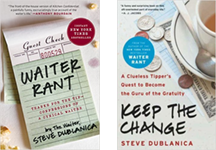A while back, a man came into my office to donate some toys. “They’re all kind of rusted and beat up,” he told me. “But you can have them.”
I didn’t want any rusty toys – and neither would any of the children my office helps – so I told him to donate them to an outfit that I knew would accept them with profuse thanks and then chuck them in the trash. This happens a lot in the charity business. About thirty percent of the food that gets donated to my food pantry is expired – sometimes ridiculously so – and we’re forced to toss it out. When clearing out a recently deceased parent’s cupboards, their grieving adult children often can’t bring themselves to just throw that box of four year old pasta away. So, they give it to me, and I get why. To them throwing that stuff away would, in a sense, be like throwing some part of their parent away. Dealing with this dynamic is a pain in the ass and makes more work for me and my volunteers, but I never turn those donations down. That’s because I’ve come to understand helping people process loss is part of the service my office provides.
“You sure you don’t need them?” the man said.
“Don’t have the room,” I said, “But the thrift shop will find a use for them.”
“They used to belong to my son,” he said. “But then he married a nigger and, well, I don’t want his kids getting them.”
The man was in his sixties and looked like he’d worked outside all his life. Tall and rangy, he still carried himself erect and I could see the muscles decades of manual labor had forged in his arms. He might have been old, but he was still physically formidable – so I figured discussing his shocking racism probably wasn’t the way to go.
“You know what I’m talking about,” he said. “Right? They’re taking over.”
A hot spurt of anger erupted in my chest because, as a fellow white guy, he was assuming I shared his views on differently complected people. I have more than my fair share of prejudices, but I’m fairly certain I’d never write off my grandchildren if my daughter married a black guy. But then instincts honed from years of working with troubled people kicked in and I intuited this guy was probably just looking to start a fight. Feeling the hairs on my neck stand up, I realized I had a live one on my hands.
“What you think?” the man said, pressing.
“I think it’s very sad that you don’t want to know your grandchildren,” I replied. “That must be very painful for you.”
“I told my son not to marry her. He did it anyway. Not my fault.”
I didn’t know why this man was so virulently bigoted and didn’t really care. At his age he’d probably never change, and admonishing sinners is not part of my job description. Besides, it would be like trying to get blood from a stone. Some part of that guy was no longer human.
Getting up from my desk, I motioned to the door. “Thank you for coming in today. I’m sorry we couldn’t help you.”
Shaking his head, the man wearily lifted himself out of his seat. “I’m just gonna throw it all out.”
After he left, I walked to an adjoining office and watched the man as he walked out of the building, into the parking lot, and climb into a weather-beaten pickup truck festooned with stickers I figured weren’t filled with slogans of sweetness and light. Then I realized I was allowing this man to process a loss a well – the fact that he was throwing his family away. Perhaps trying to donate those toys was the last flicker of connection this guy had to his son. Who knows? But no matter his reasons or how certain he was of his views; I knew he would eventually pay a very high price. Only a miracle could help him now.
“What are you looking at?” one of my co-workers said.
“One of the damned.” I replied. “One of the damned.”


This might be the only post with no comments. Kinda weird. You can’t fix stupid, man. It is what it is. Good job.